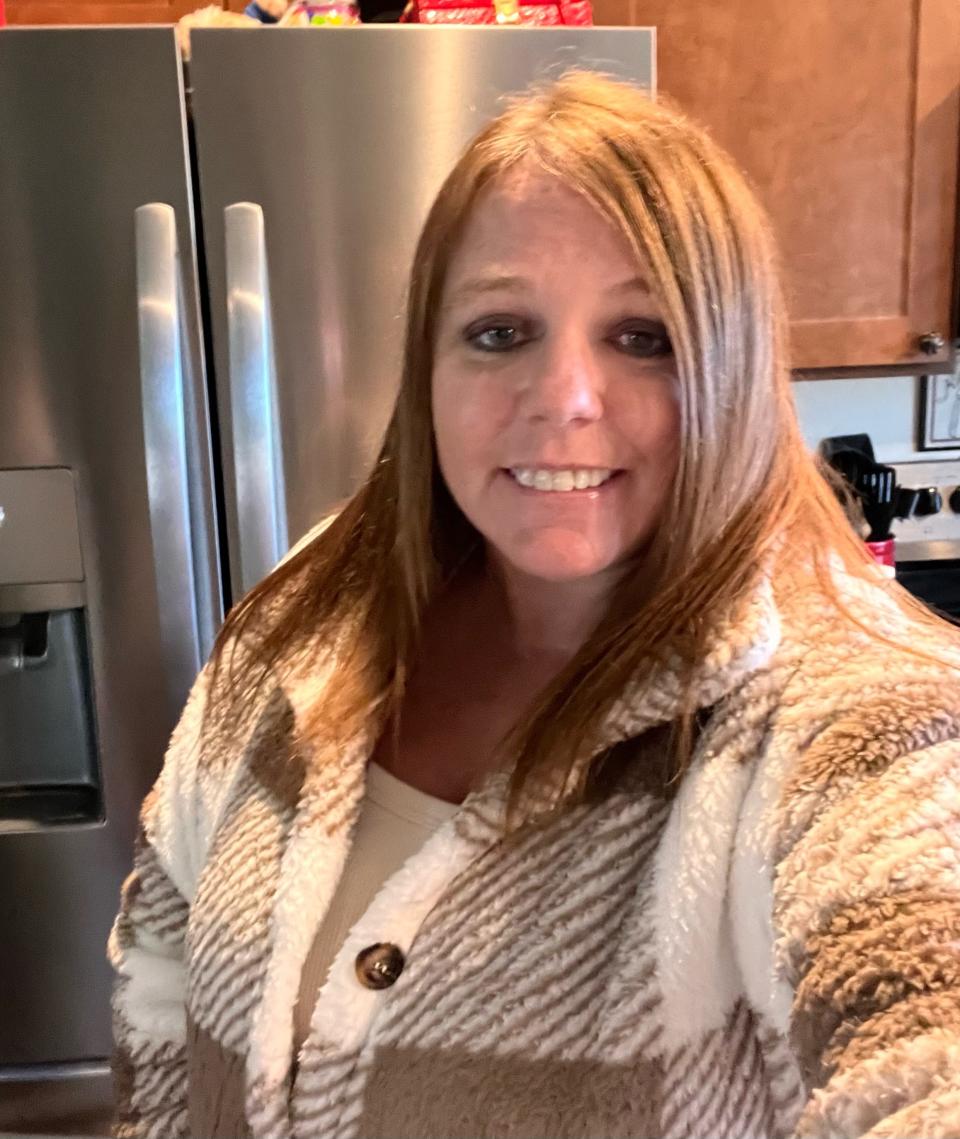Waupaca County woman shares her stiff person syndrome journey after Celine Dion's diagnosis
- Oops!Something went wrong.Please try again later.
WEYAUWEGA - When Sandy LeNoble saw Celine Dion sitting rigidly, holding back tears, telling the world she was diagnosed with stiff person syndrome in an emotional Instagram video, LeNoble knew it took many takes for Dion to get through filming.
LeNoble, 46, could feel her own body getting stiff and her hands sweating as she anxiously shared her own diagnosis with the USA TODAY NETWORK-Wisconsin over the phone a week after Dion's emotional announcement.
LeNoble, who lives in Weyauwega, is one out of about a million people like Dion diagnosed with stiff person syndrome, a rare neurological disorder that causes painful spasms and muscle stiffness, according to Johns Hopkins.
Twelve years and several misdiagnoses later, watching Dion's video was a painful memory for LeNoble, remembering how she felt when she was learning to cope with the disorder.
LeNoble first started realizing something was going on when she began falling but couldn't explain why. Sometimes on the way to dropping her son off at preschool, she would start sweating profusely, feel shaky and fall to the ground.

"When I get anxious, it would throw me into these spasms where I would be so stiff and rigid," LeNoble said. "Just putting on my shoes was hard."
The symptoms continued to progress until they started consuming LeNoble's life over the last two years. There were times LeNoble's spasms would become so severe around her waist and trunk area that she would pass out from the pain. The episodes could sometimes last up to four hours.
"It felt like it was just squeezing to the point where I couldn't breathe," she said. "I felt breathless and in so much pain all the way down to my legs and there was nothing they (doctors) could do to get through it."
More:Céline Dion has stiff person syndrome, a rare neurological disorder. What is that?
By winter 2021, LeNoble was only "about 10% mobile" and ended up in an emergency room in January.
"Basically, my husband was carrying me around or pushing me in a wheelchair," she said.
Because the syndrome is so rare, often people don't understand what's happening when they see one of LeNoble's episodes or why she can't quickly stand up after a fall.
"I've been lucky not to break any bones," she said.
It took LeNoble 12 years of doctor's appointments, medical tests and trips to the Mayo Clinic in Rochester, Minn., to get the right diagnosis.
Doctors would dismiss her pain as an exaggeration, diagnose her with severe anxiety or think she was seeking more medication for a drug addiction. She was misdiagnosed with seizures and other more common autoimmune diseases.
"In the beginning, you feel like you’re being looked at like an alien, like you’re out of your mind," LeNoble said.
Her husband recorded one of her episodes to help the doctors visualize what was going on — a tip she recommends everyone does to help their doctor understand the pain.
It wasn't until she met a neurologist at the Neuroscience Group in Neenah who had seen a case of SPS during medical school and was able to connect the symptoms to the right diagnosis.
"Finally, it just all came together," LeNoble said.

Spasms can be triggered by sudden movement, stress, cold temperatures or unexpected loud noises, according to Johns Hopkins. Since getting her diagnosis and regular IVIG infusion treatments at home, LeNoble has learned how to identify her triggers and manage her symptoms better. Leaning on her husband and kids has helped her get through it.
But there's still a lot unknown about SPS, including what exactly causes the disorder. LeNoble hopes that Dion's influence will bring more attention to others who live with the disorder and expand research that will one day lead to a cure.
"Hopefully, one day, there will be a cure and not just a treatment of our symptoms because having the spasms is like running a marathon and you're just so tired afterwards," she said.
Until then, LeNoble isn't going to let the disorder stop her from living her life.
She goes camping with her daughter often and, if she thinks she's going to have a bad day, she sits out for the day.
"We’ve decided we’re not going to let life stop us from doing the things we like to do. I just have to be mentally prepared," she said. "If you don't, in the blink of an eye, it’s going to move past you."
This article originally appeared on Appleton Post-Crescent: Weyauwega woman discusses stiff person syndrome after Celine Dion news

